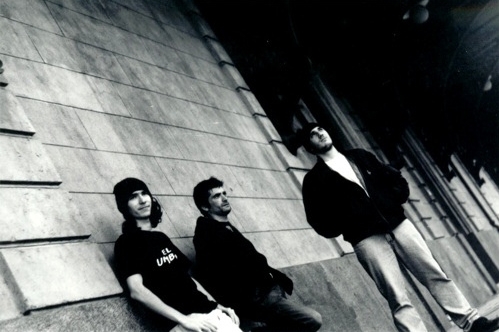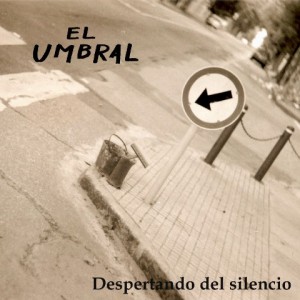
The First Lineup Of El Umbral: Juan Loskin, Alejandro Nuñez & Javier Pedrazzi.
Elvis Costello was right.
From the other end of the telescope, things can be seen.
Every Uruguayan echo boomer grew up watching bands on his flat top that he was resigned never to feel in the flesh. REM, U2, Nirvana, Guns ‘n’ Roses… he always knew such bands were hardly going to set foot in his home soil. If he had the money and the wayfaring spirit (not to mention parents that were either the pinnacle of coolness, or that just didn’t give a shit) he knew he could cross the River Plate and go to Buenos Aires to catch up with any of those bands as they toured South America. And no, nobody could have imagined back then that one day an overweight Axl Rose with a small army of guitarists in tow to replace Slash would play the Estadio Centenario. Neither could anybody have imagined that they would play the theme from the Pink Panther during an intermission as the ultimate sign of respect to the enraptured audience that attended the show.
Well, that was the way things were back then. And if it sounds like a bummer, it is because it was a bummer. Yet, the silver lining was there. And it was a particularly shimmery one.
In the same way that the best orators are always the best listeners, those who spend their lives contemplating are the ones who can take action more purposefully. And if there was something we were known to do back then, it was to wear one album after the other of all those bands that for us existed only in MTV. Assimilating the notes and inhaling the sounds as only those who know they will never watch their heroes live could ever hope to do.
Many of the Uruguayan bands that in a good and in a bad sense defined the musical identity of the country came together back then, and they are still around. Both La Vela Puerca and No Te Va Gustar, for example, became active performing units as the ‘90s were gathering pace.
And as always, the story of those bands that could never achieve mainstream success is every bit as interesting as the story of those who did manage to take all the commercial barriers down.
The story of El Umbral [The Threshold] certainly is. And the fact the band is still around (and about to issue its fourth album) just gives everything that vital throb of significance that always wins people over.

"Despertando Del Silencio" Was El Umbral's Debut Album
El Umbral officially came together in 1999, but the true inception of the band went way back to 1996, when three friends named Juan Loskin (bass), Pablo Riera (drums) and Alejandro Nuñez (guitar) would get together and play songs by Nirvana and Uruguayan linchpins such as Los Estómagos [The Stomachs]. That lineup didn’t last long, and the drummer was soon replaced by Javier Pedrazzi. At around that time, it was decided that Alejandro was also going to assume vocal duties, and the trio settled on the name El Umbral. The year was 1999. And two years later, the band finally managed to issue its debut album. It was titled “Despertando Del Silencio” [Awakening From The Silence]. Somehow, that name said all there was to be said. And what the name did not say, the music itself made clear.
Over the course of 15 tracks, “Despertando Del Silencio” took the listener through the internal disorder that has characterized post-punk albums ever since Ian Curtis commanded the dim stage of The Hacienda and sang with the horrible rightness of those who see no light at either side of the tunnel “I’ve been waiting for a guide to come and take me by the hand”. Song after song on “Despertando El Silencio” recalled that fatality and desperation over insidious melodies. Questions surfaced at every turn. “Pensando en el mar como un mundo sin igual/Me pregunto que es lo que yo puedo hacer” [Thinking about the sea as in a world that has no equal/I wonder what can I do]… “Se está viviendo muy duro/¿Cuánto mas tendremos que esperar?” [Life is getting too tough/How much longer must we wait?]. And the answer was never spoken, but it was surly implied in the most splenetic songs like “En La Cima” [On Top]. And that answer was never fulfilling, in the same way that Curtis did not get enough from the knowledge that all there was in life was touching from a distance.
And the band also found room for stripped down compositions such as “Pasos En La Lluvia” [Footsteps In The Rain] – listen to it, the guitars are acoustic, and there is even a harmonica thrown in the middle of the mix to lull you over.
On the whole, “Despertando Del Silencio” was a very well-crafted and tuneful punk rock record. Gutsy but brittle. Aloof but approachable. It suggested, it said, it repeated that we were cornered. But it was not a defeatist album. The one lesson it imparted (well, that it reaffirmed) was that the best way to get out is always through.
That was how the story of El Umbral began. Two more albums were to be issued afterwards, and a fourth one is in the making right now. I hope to review them sometime soon. It is music coming straight from the conviction that life can (and should) be deemed as a romantic matter.
Elvis Costello was right. Again.
There’s always something smouldering somewhere.
This is El Umbral’s official website.

Pingback: Month In Review – January 2011 | MusicKO